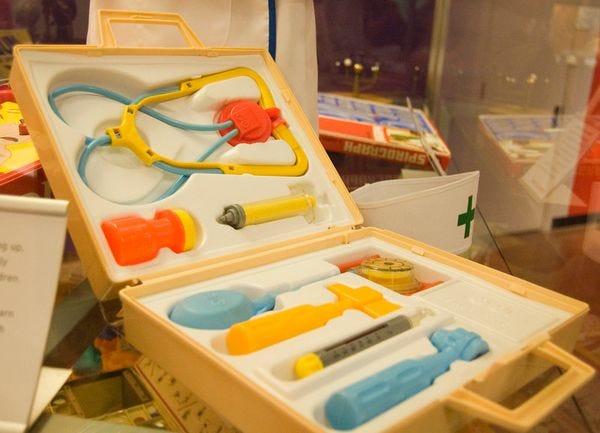US Just Giving Coronavirus Medical Supply Contracts To Any Old Telemarketer Or Arms Merchant
It's not like anyone's checking.
Right on the heels of The Lady Who Couldn't Feed Puerto Rico and The Wedding Planner Who Might Not Feed Anyone Either , we learn from a ProPublica investigation that the US government has handed out a whole bunch of multimillion-dollar no-bid contracts to companies that have never had federal contracts before, including
A firm set up by a former telemarketer who once settled federal fraud charges for $2.7 million. A vodka distributor accused in a pending lawsuit of overstating its projected sales. An aspiring weapons dealer operating out of a single-family home.
So let's all tune in to the hot new hit, So! You Think You Can Get A Huge Medical Supplies Contract! (Sure, You Can!)
You see, the COVID-19 pandemic is an emergency, and under federal purchasing law, that means government agencies can overlook rules requiring competitive bidding when there's an "unusual and compelling urgency." And in the rush to make up for inadequate supplies of medical equipment all over the country, a number of agencies have sought to fast-track purchases of scarce supplies by doing the bare minimum of vetting, looking only at whether "companies and their owners were not officially barred from receiving government contracts." That's led to all sorts of fun shenanigans, like arranging contracts with companies that only incorporated "days or weeks before landing multimillion-dollar government contracts."
But don't worry: Since the contracts don't pay out until the supplier actually delivers something, no taxpayer money is being handed to incompetent contractors up front, hooray. But the downside is that when suppliers don't actually supply a single thing, the government has to go back, award another contract, and hope maybe the next outfit knows what it's doing, and that leads to delays and uncertainty about the supply chain in a goddamned emergency. The article includes several informative insights from experts on government and emergency supply management on why this is a shitty way to do things, which we will skip right past so we can tell you about the screwups.
For context's sake (and possibly to let us know this may be a series), ProPublica points out that there are a LOT of brand-new contractors getting in on the medical supplies money. Many of them may even be perfectly legit! There are
about 345 first-time federal contractors promised at least $1.8 billion in deals by the Trump administration since March, representing about 13% of total government spending on pandemic-related contracts of $13.8 billion. [...] Like the three companies, many of the new contractors have no experience acquiring medical products.
ProPublica's analysis found that 51% of the deals with first-time contractors were without competition, compared with 32% of pandemic-related contracts overall.
Big surprise: One of the three firms in the report, the wannabe arms merchant whose official address is a house in Pittsburgh, hasn't delivered bupkis, and its contract was cancelled. The other two may not be able to meet their contracts' deadlines, either.
But wow, that weapons merchant!
On April 20, the Department of Veterans Affairs granted a $14.5 million contract for N95 masks to Bayhill Defense , which formed in 2017 and lists a house in Pittsburgh in government filings. (The firm also has warehouse space in a Pittsburgh suburb, according to its website .)
It's a really cool company, at least as far as its website goes. You need former Soviet-bloc attack helicopters, Bayhill says it'll sell 'em to you! Or at least the site has a lot of photos that are among the first results for a Google image search of any given weapon system.

ProPublica notes the company has a federal firearms license, and its website says it can deliver guns, ammo, and weapons systems to "the United States and other friendly nations." In what may be a bit of a letdown, a search of procurement data shows Bayhill "has never received a contract from the Department of Defense." Probably because the owner misplaced the keys to the attack helicopter in the backyard. As for its mask contract,
Bayhill Defense agreed to provide the masks in 10 days, but it never delivered any, and the VA canceled the contract this month without payingthe company. Reached by phone,Andrew Taglianetti, the company's president, declined to explain how Bayhill Defense secured the deal or why it failed.
"It's all good," Taglianetti said.
Keep reaching for your dreams, Mr. Taglianetti!
The other examples aren't quite as flamboyant, because it's hard to top "arms dealer in a split-level" (poetic license; we do not know the actual floorplan) , but they also do not seem like companies that are well-suited to fulfilling a big government contract. The telemarketer guy, Paul Wexler, settled a Federal Trade Commission lawsuit in 2013 after his company was accused of "illegal robocalling, making unauthorized charges to consumers' bank accounts and falsely claiming to be a nonprofit organization," and also "misrepresented itself as a credit counseling service," too. The company was hit with a $2.7 million judgment in the case.
But nothing prevented Wexler from getting a federal contract, so he incorporated an outfit called "Fillakit LLC" in Florida. A week later, on May 7, Fillakit got a FEMA contract worth $10.5 million to provide nasal swabs and nasal swab accessories.
Mr. Wexler, whose voice I imagine sounds just like Dan Aykroyd trying to explain to Jane Curtain that the "Johnny Invisible Pedestrian" Halloween costume is perfectly safe, didn't have time to talk about his company with ProPublica:
"I'd love to help you, I can't right now," he said. "We're doing so much right now, the volume that we're doing, I've got hundreds of people and I just don't have time to do this."
Wexler said Fillakit is preparing to send the swabs and containers to FEMA. "We're just pumping them out as fast as we can for them, so I've really got to stay on point here," he said.
In a written statement last Friday, FEMA said it has paid Fillakit $381,000 for one delivery of swabs and containers. The company has less than six weeks to provide the remaining $10.1 million worth of test supplies.
See? Already successful! And the man is busy, busy, busy on the rest of it. How dare you mock. (See the full story for fun thoughts from a dude who did business with Wexler in 2012, too.
The vodka company, Medea Inc., sounds like it's doing a great job, too. It got a $48.8 million contract to supply masks to FEMA, although the company has a pending fraud lawsuit against it for allegedly making false claims that "Costco and Kroger had agreed to stock the brand nationwide." But pending litigation isn't a roadblock to federal contracts, either, so the company, which sells vodka in bottles with customizable LED lights on 'em, should do a bang-up job of fulfilling the contract by June 1, although in this case, FEMA wouldn't say whether any masks had yet been shipped.
But our favoritest story in the piece is about a company whose contract fell through due to circumstances that were a bit beyond its control:
The VA gave a $14.7 million contract for masks to Aunt Flow , an Ohio-based seller of tampons and other menstrual products for dispensers in women's bathrooms. When orders for its products slowed during the pandemic, the company converted its own manufacturing facilities in China to produce surgical masks, and it began selling them to existing clients as well as federal agencies. Then, it tried to capitalize on its manufacturing relationships in China to bring in a shipment of the heavier-duty N95 masks for veterans hospitals.
But as the supplies were being loaded on a plane, the Chinese government ordered all of the manufacturer's masks diverted for domestic use, said Claire Coder, the company's CEO. She said she immediately called the VA to inform it that the company couldn't fulfill the deal, and the money was never paid.
So honestly, even though Aunt Flo's performance was a bit spotty, at least that company wasn't caught trying to pad its résumé. It's not the company's fault it was cursed with bad luck, and only the Red Army should be blamed for cramping its style. Heck, this wasn't even a case of bloated bureaucracy. So don't rag on them: The best laid plans of mice and menstrual product makers don't always work out so hot, Flash.
[ ProPublica / Photo: Christiano Betta, Creative Commons License 2.0 ]
Yr Wonkette is entirely AD-FREE because you people keep giving us money, even after that last paragraph we hope. Please help us keep the servers humming, the writers paid, and Dok in a Time Out.
Do your Amazon shopping through this link, because reasons .




The kind of prose one expects from a Doktor of Rhetoric.
Yes.